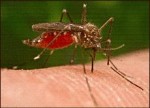
The bite of a mosquito now brings along more then just a bump on your skin. Mosquitoes have now been known to carry the West Nile virus. According to revolutionhealth.com/west-nile-virus-watch, the West Nile virus also called West Nile Encephalitis, meaning inflammation of the brain.
The virus is commonly found in humans, birds and other animals. The virus originated from Africa, Eastern Europe, West Asia, and the Middle East prior to 1999. West Nile was then spread by mosquitoes, which contracted the virus by feeding on infected birds and spread it by biting humans and other animals.
Brandy Pitts, a sophomore at Grambling State University from Slidell majoring in criminal justice, stated that she feels it is a very serious virus that can be prevented if people just take the proper precautions for protecting themselves from mosquitoes.
In 2006, most people who were infected with the West Nile virus had no symptoms and experienced mild illness with fever, headache and body aches before fully recovering. In some serious cases it has caused permanent neurological damage and can be fatal.
These symptoms fall in the place of Encephalitis, which include the rapid onset of severe headache, high fever, stiff neck, confusion, loss of consciousness, and muscle weakness.
Death may occur in some instances. Unfortunately time has passed, we are now in the year of 2007, and the West Nile virus is starting to hit close to home at Grambling.
The Centers for Disease Control and Prevention has reported 203 cases of West Nile virus across the country, with five deaths. Louisiana currently has the third highest number of cases, behind Colorado and Texas. Caddo has been the parish hardest hit by West Nile virus, where there are 13 of Louisiana’s cases.
It was reported that a man who frequently visited Lincoln Parish where five dead birds were found had tested positive for West Nile in recent months. The case took a turn and was said to be reclassified as a case from Jackson Parish.
“It is not extraordinary that a person who is outside a lot and not taking precautions has come down with the disease,” said Dr. Raoult Ratard, state epidemiologist.
“Knowing my history of West Nile virus I feel that I’m in danger because I never know who or what might carry the virus,” said Pitts.
People throughout the state are feeling similar to Pitts.
Lanisha Davis from Oakland, Calif., who is a junior at Dillard University majoring in public health, feels the community could do more to better protect themselves from mosquitoes that carry the West Nile virus.
Davis said they could try to keep certain areas clean from mud and water because it is a breeding place for mosquitoes.
Summer and rain probably won’t be here not for much longer, but in the meantime, here are some recommendations that can help reduce the risk of an outbreak of the West Nile virus.
– The community can watch out for stagnant water, particularly if it is nutrient-laden; it is inviting for Culex mosquitoes.
– Widespread mosquito control efforts, including the use of spraying larvicides, may be warranted.
– In the effort to reduce becoming infected with West Nile, you could stay indoors at dawn, dusk and in early evening.
– Wear long-sleeved shirts and long pants whenever you are outdoors. Apply insect repellent sparingly to exposed skin.
